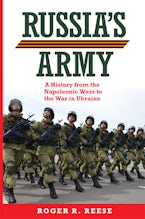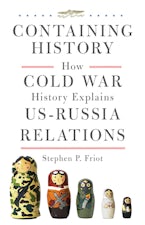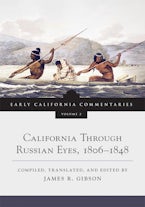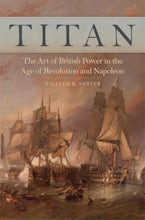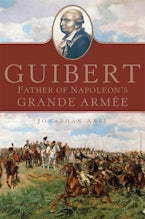- Home
- Campaigns and Commanders Series
- history
- Russia's Army
Russia's Army
A History from the Napoleonic Wars to the War in Ukraine
Published by: University of Oklahoma Press
Imprint: University of Oklahoma Press
240 Pages | 6 x 9 | 3 Maps
$34.95
$29.95
With the invasion of Ukraine, Vladimir Putin’s Russia seems to have stepped out of time, reverting to an imperial era of conquest and expansion. But as Roger Reese points out in this comprehensive new history, Russia’s way of war has changed little from one century to the next, one regime to another, from the army of the tsar to the army of today. Russia’s Army reveals how the Imperial Russian Army and its successors, the Soviet Army and the army of the Russian Federation, confronted the state’s foreign policy challenges—projecting power and defending the empire—and the domestic challenge of containing internal unrest generated by nationalism, competing ethnic and religious identities, and political discontent. These twin challenges, in turn, drove defense policy and the planning and conduct of war.
From the beginning of the nineteenth century, the development of the army was driven by shifts in the European balance of power and changes in global diplomacy, politics, economics, and society. Reese identifies themes that weave their way through this military history: the adoption of a strategy to maintain a defensive posture in the West, an offensive strategy in the Balkans, and an expansionist policy in the East; maintenance of a large standing army; and a consistent unease about the army’s and non-Russian minorities’ loyalty to the state. These themes, he shows, have emerged in times of peace and war, as heads of state have made operational and strategic military decisions while managing civil-military relations—from the times of tsarist Russia through the collapse of the Soviet empire, when Putin sought to restore authoritarian rule and hegemony over the former Soviet states of the USSR.
A comprehensive account of the history of the Russian army from 1801 to 2022, Reese’s is the first book to link Russian military history across three distinct eras and to situate this history within the context of military strategy and doctrine, as reflected in specific campaigns, issues of manning and maintaining an army, and relations between army and society, at home and in the “near abroad.”
From the beginning of the nineteenth century, the development of the army was driven by shifts in the European balance of power and changes in global diplomacy, politics, economics, and society. Reese identifies themes that weave their way through this military history: the adoption of a strategy to maintain a defensive posture in the West, an offensive strategy in the Balkans, and an expansionist policy in the East; maintenance of a large standing army; and a consistent unease about the army’s and non-Russian minorities’ loyalty to the state. These themes, he shows, have emerged in times of peace and war, as heads of state have made operational and strategic military decisions while managing civil-military relations—from the times of tsarist Russia through the collapse of the Soviet empire, when Putin sought to restore authoritarian rule and hegemony over the former Soviet states of the USSR.
A comprehensive account of the history of the Russian army from 1801 to 2022, Reese’s is the first book to link Russian military history across three distinct eras and to situate this history within the context of military strategy and doctrine, as reflected in specific campaigns, issues of manning and maintaining an army, and relations between army and society, at home and in the “near abroad.”
Roger R. Reese is Professor of History at Texas A&M University and has authored numerous articles and books on the Russian military, including Why Stalin’s Soldiers Fought: The Red Army’s Military Effectiveness in World War II.
“A first-rate treatment of the Russian army which combines the advantages of explaining the present as well as the past. Based on excellent scholarship, this relevant work is a significant contribution to military history.”—Jeremy Black, author of War and Technology
“Concise yet nuanced, Russia’s Army provides beautifully balanced coverage of the Russian military as an institution, its experience in peacetime and war, and the relationship between the military and society…This is clear and accessible military history that belongs on every reader's bookshelf.”—Reina Pennington, author of Wings, Women, and War: Soviet Airwomen in World War II Combat

